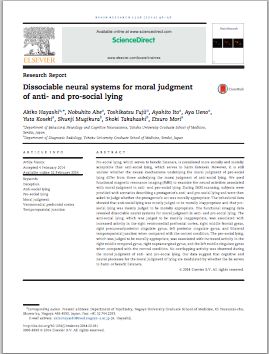お知らせ
阿部准教授と伊藤研究員の共著論文が『Brain Research』に掲載されました
2014.03.26
 阿部修士准教授(上廣こころ学研究部門)と伊藤文人日本学術振興会特別研究員らの共著論文が、脳神経科学の国際ジャーナル『Brain Research』(vol.1556, 27 March 2014)に掲載されました。
阿部修士准教授(上廣こころ学研究部門)と伊藤文人日本学術振興会特別研究員らの共著論文が、脳神経科学の国際ジャーナル『Brain Research』(vol.1556, 27 March 2014)に掲載されました。
この論文では、他者を傷つけてしまう「悪い嘘」と、他者を思いやってつく「良い嘘」が道徳的に許容できるか否かを判断する際の脳のメカニズムを調べた研究です。fMRI(機能的磁気共鳴画像法)を用いた実験によって、この二種類の嘘の道徳判断は異なる神経基盤によって実現されていることが明らかになりました。
論文の詳しい情報は、ジャーナルのウェブサイトをご覧ください。下記リンクからアクセス可能です。
Hayashi A, Abe N, Fujii T, Ito A, Ueno A, Koseki Y, Mugikura S, Takahashi S, Mori E (2014)
Dissociable neural systems for moral judgment of anti- and pro-social lying
Brain Research 1556: 46-56
URL:http://dx.doi.org/10.1016/j.brainres.2014.02.011
○Abstract
Pro-social lying, which serves to benefit listeners, is considered more socially and morally acceptable than anti-social lying, which serves to harm listeners. However, it is still unclear whether the neural mechanisms underlying the moral judgment of pro-social lying differ from those underlying the moral judgment of anti-social lying. We used functional magnetic resonance imaging (fMRI) to examine the neural activities associated with moral judgment in anti- and pro-social lying. During fMRI scanning, subjects were provided with scenarios describing a protagonist׳s anti- and pro-social lying and were then asked to judge whether the protagonist׳s act was morally appropriate. The behavioral data showed that anti-social lying was mostly judged to be morally inappropriate and that pro-social lying was mainly judged to be morally appropriate. The functional imaging data revealed dissociable neural systems for moral judgment in anti- and pro-social lying. The anti-social lying, which was judged to be morally inappropriate, was associated with increased activity in the right ventromedial prefrontal cortex, right middle frontal gyrus, right precuneus/posterior cingulate gyrus, left posterior cingulate gyrus, and bilateral temporoparietal junction when compared with the control condition. The pro-social lying, which was judged to be morally appropriate, was associated with increased activity in the right middle temporal gyrus, right supramarginal gyrus, and the left middle cingulate gyrus when compared with the control condition. No overlapping activity was observed during the moral judgment of anti- and pro-social lying. Our data suggest that cognitive and neural processes for the moral judgment of lying are modulated by whether the lie serves to harm or benefit listeners.
Dissociable neural systems for moral judgment of anti- and pro-social lying
Brain Research 1556: 46-56
URL:http://dx.doi.org/10.1016/j.brainres.2014.02.011
○Abstract
Pro-social lying, which serves to benefit listeners, is considered more socially and morally acceptable than anti-social lying, which serves to harm listeners. However, it is still unclear whether the neural mechanisms underlying the moral judgment of pro-social lying differ from those underlying the moral judgment of anti-social lying. We used functional magnetic resonance imaging (fMRI) to examine the neural activities associated with moral judgment in anti- and pro-social lying. During fMRI scanning, subjects were provided with scenarios describing a protagonist׳s anti- and pro-social lying and were then asked to judge whether the protagonist׳s act was morally appropriate. The behavioral data showed that anti-social lying was mostly judged to be morally inappropriate and that pro-social lying was mainly judged to be morally appropriate. The functional imaging data revealed dissociable neural systems for moral judgment in anti- and pro-social lying. The anti-social lying, which was judged to be morally inappropriate, was associated with increased activity in the right ventromedial prefrontal cortex, right middle frontal gyrus, right precuneus/posterior cingulate gyrus, left posterior cingulate gyrus, and bilateral temporoparietal junction when compared with the control condition. The pro-social lying, which was judged to be morally appropriate, was associated with increased activity in the right middle temporal gyrus, right supramarginal gyrus, and the left middle cingulate gyrus when compared with the control condition. No overlapping activity was observed during the moral judgment of anti- and pro-social lying. Our data suggest that cognitive and neural processes for the moral judgment of lying are modulated by whether the lie serves to harm or benefit listeners.

